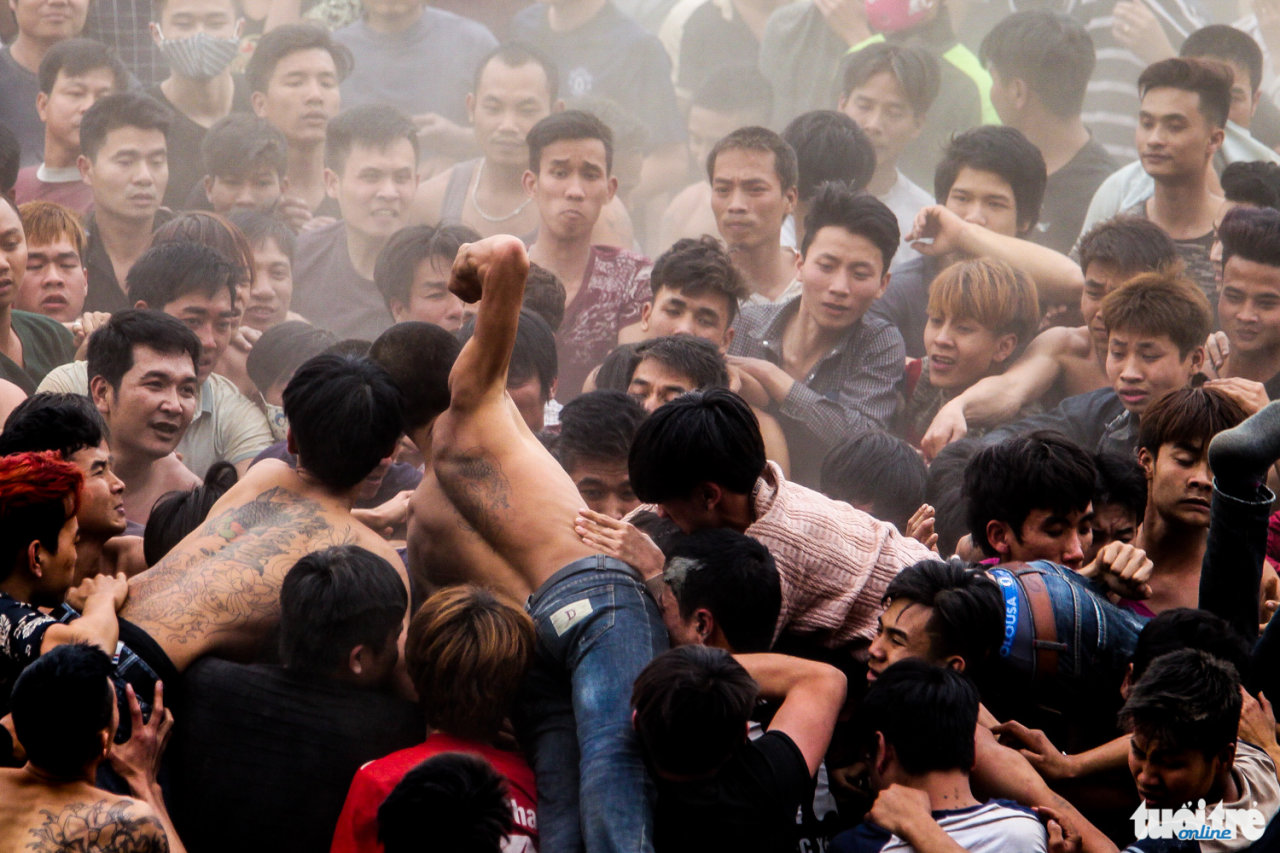The time before and after the Lunar New Year holiday is usually for many traditional festivals in Vietnam, especially in the north.
However, some of those events have been criticized for creating chaos with thousands of participants scrambling, beating each other and risking injury to get lucky symbols which they believe will bring them luck in the new year.
Meanwhile, other events like the Nem Thuong Pig Slaughter festival in Quang Ninh Province also attract regular controversy for its custom of slaughtering pigs alive.
Bowing to public pressure, the organizers this year censored the killing by moving it into a more private area, instead of the public place in front of thousands of people including children as in previous years.
Many people have called on those festivals to be stopped, labeling them violent, cruel, superstitious and old-fashioned.
A number of expats have shared their thoughts with Tuoi Tre News on those types of events.
Drawing the line

It’s difficult for a foreigner to say “you should stop your local tradition,” and I don’t think we can stop it. When I went as a tourist to a place like Spain, I did the running of the bulls and at the end of the festival they kill the bulls. It’s very cruel, and actually a slow painful death and people are very opposed to that but it has been going for hundreds and hundreds of years, so I think it needs to come from local people. They say this is enough, the new generation says “this is enough, we don’t follow this anymore.”
The solution in my opinion is encouraging the young generation to stop because only locals have the right to stop their tradition. Young people should voice their opinion and find the balance between what is important to maintain as part of the local culture and what is not acceptable practice in 2016.
To me, what matters is where you draw the line to see if it’s too violent, gross, or it’s important to keep the tradition alive.
So I agree with the measure to limit the access to the slaughtering. It’s inappropriate for children to see that scene. It’s like watching a scary horror film, but even worse because it’s a real life, real animal being killed right in front of them. It would encourage children to resort to violence, not just animal violence, after they see death and blood at such an early age. It can have a long-lasting impact and I think in some way in the future this will be played out in the children’s life.
I like to learn about the local tradition when I go to a place, so to get rid of the traditional festivals is to remove part of the culture, and possibly disrespectful to the ancestry and history.
I don’t have any problem with events in which people race for lucky things, I’ve seen similar kinds of traditions in other cultures as well. If that’s what people want to put themselves at risk for, to try to get the lucky ball or token, fight for the belief that they are passed on or for their family’s pride, or whatever it is, I think it’s fine, and to me it’s a genuine spectacle and entertainment.
Governments shouldn’t influence these traditions too strongly, only when it gets out of control should police step in, but not overly. I think it’s good to let people have their tradition, let them grow, and develop changes organically by themselves.
Jon Aspin, Australian, Staff Editor at Word Vietnam
Slaughtering is old-fashioned

I understand that festivals are held to pray for god and they are traditional, however, personally, it seems scary to me. I think slaughtering is old-fashioned today. Some countries like Nepal gave it up. It's better for slaughtering festivals to be discontinued in the future.
I heard that a shrine in Japan has a custom that frogs are sacrificed alive to pray for the productiveness of grains on the 1st of January. Some Japanese people don't agree with the custom and some of them have called the shrine and told it to quit the custom.
Megumi Saito, Japanese
Local people to decide

I feel if this is a tradition and part of Vietnamese culture, I have no right to comment. I would never participate nor enjoy a festivity like this, but I respect it.
Certain traditions should and will never be changed. If there are necessary changes to be made, it's up to the local people to communicate and discuss such changes. It's up to the people in the local community to determine what should or shouldn't be celebrated. Just because people think a certain way doesn't mean they should change their traditions for others.
To or not to eliminate traditional festivals depends on the people and the authorities. They should have to communicate and come to an agreement and/or compromise.
Honestly, each country has unique traditions and festivities. There are probably many countries that have cruel games, festivities and traditions. Nobody has the right to demand anything without both parties talking and communicating possible solutions for a positive change.
In America, there are strict animal laws but there are still certain things that happen that many people disagree with. There are good and bad things in all parts of the world and definitely in all countries. Just because it happens doesn't mean it's necessarily bad just because people disagree with it.
Philip Veinott, American



















































